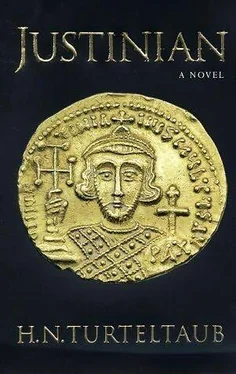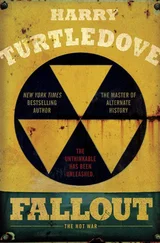Harry Turtledove - Justinian
Здесь есть возможность читать онлайн «Harry Turtledove - Justinian» весь текст электронной книги совершенно бесплатно (целиком полную версию без сокращений). В некоторых случаях можно слушать аудио, скачать через торрент в формате fb2 и присутствует краткое содержание. Жанр: Историческая проза, на английском языке. Описание произведения, (предисловие) а так же отзывы посетителей доступны на портале библиотеки ЛибКат.
- Название:Justinian
- Автор:
- Жанр:
- Год:неизвестен
- ISBN:нет данных
- Рейтинг книги:3 / 5. Голосов: 1
-
Избранное:Добавить в избранное
- Отзывы:
-
Ваша оценка:
- 60
- 1
- 2
- 3
- 4
- 5
Justinian: краткое содержание, описание и аннотация
Предлагаем к чтению аннотацию, описание, краткое содержание или предисловие (зависит от того, что написал сам автор книги «Justinian»). Если вы не нашли необходимую информацию о книге — напишите в комментариях, мы постараемся отыскать её.
Justinian — читать онлайн бесплатно полную книгу (весь текст) целиком
Ниже представлен текст книги, разбитый по страницам. Система сохранения места последней прочитанной страницы, позволяет с удобством читать онлайн бесплатно книгу «Justinian», без необходимости каждый раз заново искать на чём Вы остановились. Поставьте закладку, и сможете в любой момент перейти на страницу, на которой закончили чтение.
Интервал:
Закладка:
"Yes, Emperor." The eunuch bowed. John, afflicted or not, suddenly walked with longer, straighter strides as the excubitores led him out of the palace.
My giving him presents eased the minds of the other guests brought so late to the dining hall. John having departed, however, I said to those bureaucrats, "One of your number truly was ill. What have the rest of you to say for yourselves? When the Emperor of the Romans summons you to a feast, should you not make every effort to attend him?"
They all began talking at once, some trying to justify claiming illness while hale, others still trying to claim illness despite healthy appearance. In the course of a day's work, the Emperor of the Romans normally hears a good many lies. In the course of a few minutes, I heard as many lies as I normally do in a day's work.
"Enough!" I said at last, whereupon the bureaucrats mercifully fell silent. "The plain and simple truth is, you did not come because you were afraid of what I might do to you."
"After what happened at your last feast, Emperor," one of them blurted, "can you blame us?"
"Of course I can blame you," I answered. He cringed. They all cringed. "The men I had killed after my last feast were every one of them traitors," I went on. "Are you traitors? Do you think I think you are traitors? Do you think you are traitors? Is that why you stayed away from me?"
I listened to denials as empty and pointless and useless as their pretenses at sickness had been. Had I believed them, the only course left open to me would have been to promote every one of the rascals making them, or perhaps to order Cyrus the patriarch to declare them numbered among the saints.
But I did not believe them. Their evident good health and their equally evident fear of me convicted them all. "Liars!" I shouted, cutting through their babble. "By your own actions shall you be judged. If you do not trust me, how can I be expected to trust you? You are all sacked, every last one of you."
This they bore up under with equanimity. I heard one of them mutter to another, "Better to lose my position than my neck." Doing their deceitful best to appear dejected, they turned and made for the door of the dining hall where they had not eaten.
"Stop!" I said sharply. "I did not give you leave to go. When I say you are sacked\a160…" Now I stopped. They would find out soon enough. Meanwhile, at my order, the excubitores bound their wrists behind them. "Is everything in full readiness?" I asked Myakes.
"Oh, yes, Emperor," he answered, rare in that he was loyal and obedient even when not altogether happy with my purposes. "What with that John who really was sick, we even have one left over."
"Fine. Let's get on with it, then," I said. At swords' point, the excubitores made the functionaries leave the palace of Blakhernai. We marched them to a dromon moored on the Golden Horn not far from the palace: not far from the pier at which Theodora had reached the imperial city, either.
Torches blazed by and on the galley, which carried a full crew of oarsmen and sailors. Two piles of coarse canvas, smaller than the sail, stood on deck. So did stacked stones, as if for a catapult. One by one, the miscreants I had seized stumbled up the gangplank onto the dromon. The captain was a young fellow named Stephen, whom I had recently raised to the dignity of patrician. He prostrated himself on the deck as soon as I came aboard.
"Rise," I said impatiently. "I want this done."
"Shouldn't be too hard, Emperor." He looked at the prisoners, nodding on approval on seeing them already in bonds. "No, shouldn't be too hard. They aren't going anyplace." His smile gleamed in the torchlight.
At his orders, the sailors cast off the lines mooring the dromon to the wharf. The rowers backed oars, then turned and took us out of the Golden Horn, past the lighthouses marking the channel, and into the middle of the Sea of Marmara. Lamps and torches and candles made Constantinople glow and twinkle far more brightly than the star-strewn sky overhead.
"What are you going to do to us, Emperor?" asked one of the bureaucrats who had not cared to enjoy my hospitality. "Are you exiling us to Anatolia?"
"You'll know soon enough," I answered, "you before all the others." That did little to reassure him, but reassuring him was not my object. To Stephen, I said, "Have we gone far enough yet?"
"Should be fine, Emperor," he answered. "We're about halfway between the city and the other shore." He pointed east toward Chalcedon, whose lights were far fewer and of smaller extent than those of the imperial city.
"Well, then," I said, and nodded toward a couple of the excubitores who had boarded the dromon with us. "Deal with the curious one first."
Going over to the piled canvas, they picked up one of the sacks there and threw it over the bureaucrat's head. Before he let out more than one startled squawk, they knocked him down, tying the mouth of the bag securely shut with a length of rope. The other end of the rope they tied to one of the stones. Ignoring the frantic kicks from within the sack, they pushed it and the stone into the Sea. It sank very quickly.
"No, Emperor!" the other disloyal bureaucrats shouted. "Not us, Emperor!" "We didn't do anything!" "We're innocent!" "Have mercy!"
At my nod, the excubitores popped the second one into a sack, tied the sack to a stone, and shoved sack and stone and all into the water. The outcries from within cut off as abruptly as if the fellow had been decapitated.
Bawling like steers, the rest of the bureaucrats tried to break away from the guardsmen who hemmed them in. One succeeded and, being chased by two excubitores, leaped into the Sea of Marmara of his own accord. I wondered if he could swim with his hands tied behind his back. By his floundering, I doubt he could have swum had they been untied. He spluttered a couple of unintelligible curses or pleas before his head sank beneath the surface and did not rise again.
Methodically, the excubitores threw sacks over the other bureaucrats and flung them into the sea. "There goes the last of them," Myakes said when it was done. He rubbed at his calf; one of the men being sacked had managed to kick him. "What now?"
"A good night's work," I answered. "Now we go back to the palace, of course, unless you know of someone else who needs killing so badly, it won't keep till morning."
He shook his head. "That's not what I meant, Emperor. What now? What comes next? You'll have people afraid to come to your feasts and even more afraid not to. Is that what you want?"
"Of course that's what I want," I answered; Myakes was not usuall y so dim. "People who fear me will be too afraid to plot against me. They'll obey instead."
"Unless you make them so afraid, they think striking at you is a better bet than waiting to see what you do next," Myakes said.
"If I kill enough of them- once I kill enough of them- the rest will be too cowed to let a thought like that enter their minds," I said. Myakes looked as if he wanted to argue further; I cut him off by saying to Stephen, "Take us back to the harbor. We're through here."
"Yes, Emperor," he said, and gave the oarsmen their orders.
On my return to the Blakhernai palace, Theodora asked, "All good?"
"All good," I answered. "We have a couple of sacks left over, as a matter of fact." I explained about the bureaucrat who leaped into the sea before the excubitores could give him his new, all-encircling cloak, and wondered whether God would condemn him as a suicide. That done, I finished, "If you have anyone in mind for a leftover, let me know, and I'll tend to it."
"I think about it," she answered seriously.
Having made it clear to the people- and, most of all, to the people possessed of authority- in Constantinople that I aimed to rule as King Stork rather than King Log, I was afforded few opportunities over the next couple of years to exhibit storklike behavior, as no one dared risk my displeasure in any way. Life was good.
Читать дальшеИнтервал:
Закладка:
Похожие книги на «Justinian»
Представляем Вашему вниманию похожие книги на «Justinian» списком для выбора. Мы отобрали схожую по названию и смыслу литературу в надежде предоставить читателям больше вариантов отыскать новые, интересные, ещё непрочитанные произведения.
Обсуждение, отзывы о книге «Justinian» и просто собственные мнения читателей. Оставьте ваши комментарии, напишите, что Вы думаете о произведении, его смысле или главных героях. Укажите что конкретно понравилось, а что нет, и почему Вы так считаете.












